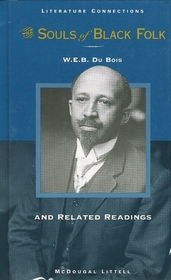Search -
The Souls of Black Folk and Related Readings
The Souls of Black Folk and Related Readings
Author:
William Edward Burghardt Du Bois (1868-1963) is the greatest of African American intellectuals--a sociologist, historian, novelist, and activist whose astounding career spanned the nation's history from Reconstruction to the civil rights movement. Born in Massachusetts and educated at Fisk, Harvard, and the University of Berlin, Du Bois penn... more »
Author:
William Edward Burghardt Du Bois (1868-1963) is the greatest of African American intellectuals--a sociologist, historian, novelist, and activist whose astounding career spanned the nation's history from Reconstruction to the civil rights movement. Born in Massachusetts and educated at Fisk, Harvard, and the University of Berlin, Du Bois penn... more »
ISBN-13: 9780395901076
ISBN-10: 0395901073
Publication Date: 2/1998
Pages: 384
Reading Level: Young Adult
Rating: 2
ISBN-10: 0395901073
Publication Date: 2/1998
Pages: 384
Reading Level: Young Adult
Rating: 2
4.3 stars, based on 2 ratings
Publisher: Houghton Mifflin School
Book Type: Hardcover
Members Wishing: 1
Reviews: Amazon | Write a Review
Book Type: Hardcover
Members Wishing: 1
Reviews: Amazon | Write a Review
Genres:
- Children's Books >> Literature & Fiction >> Literary Criticism & Collections
- Literature & Fiction >> World Literature >> United States >> Black & African American >> Dubois, W. E. B.
- Teen & Young Adult >> Education & Reference




